-
 Bitcoin
Bitcoin $82,099.5826
-1.34% -
 Ethereum
Ethereum $1,817.9545
-1.07% -
 Tether USDt
Tether USDt $0.9999
0.02% -
 XRP
XRP $2.0815
-3.96% -
 BNB
BNB $595.8647
-1.53% -
 Solana
Solana $124.0327
-0.92% -
 USDC
USDC $1.0000
0.01% -
 Dogecoin
Dogecoin $0.1634
-3.94% -
 Cardano
Cardano $0.6445
-4.65% -
 TRON
TRON $0.2336
1.34% -
 Toncoin
Toncoin $3.9381
2.61% -
 Chainlink
Chainlink $13.2201
-3.75% -
 UNUS SED LEO
UNUS SED LEO $9.0947
-5.84% -
 Stellar
Stellar $0.2646
-1.90% -
 Avalanche
Avalanche $18.6234
-3.91% -
 Shiba Inu
Shiba Inu $0.0...01214
-3.88% -
 Sui
Sui $2.2126
-6.78% -
 Hedera
Hedera $0.1604
-6.61% -
 Polkadot
Polkadot $4.0237
-1.97% -
 Litecoin
Litecoin $82.1655
-4.48% -
 MANTRA
MANTRA $6.2849
-1.13% -
 Bitcoin Cash
Bitcoin Cash $298.8203
-2.66% -
 Dai
Dai $1.0000
0.02% -
 Bitget Token
Bitget Token $4.4293
-4.57% -
 Ethena USDe
Ethena USDe $1.0000
0.01% -
 Pi
Pi $0.6976
-9.77% -
 Hyperliquid
Hyperliquid $12.5853
-0.74% -
 Monero
Monero $215.4717
-0.22% -
 Uniswap
Uniswap $5.8825
-1.85% -
 Aptos
Aptos $5.1958
-2.29%
How to choose the right Ethereum wallet type?
Choose an Ethereum wallet based on your tech skills, ETH holdings, and transaction frequency; hardware wallets offer superior security for larger amounts, while software wallets are convenient for frequent trading, but carry higher risk.
Mar 24, 2025 at 09:14 pm
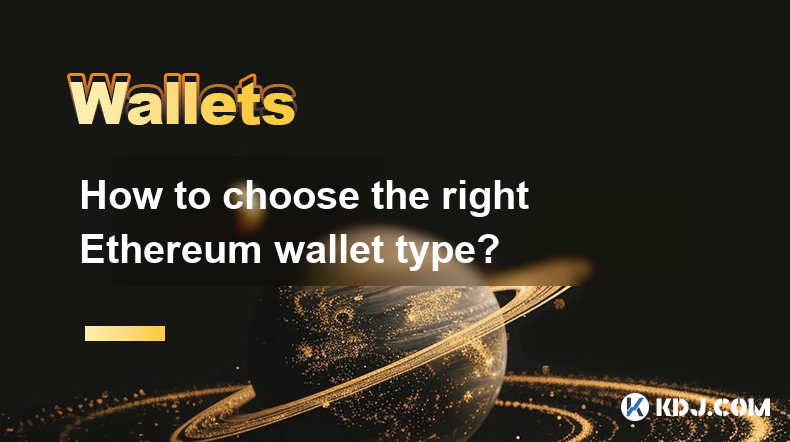
How to Choose the Right Ethereum Wallet Type?
Choosing the right Ethereum wallet is crucial for securing your ETH and other ERC-20 tokens. The best type depends heavily on your technical skills, the amount of ETH you hold, and how frequently you transact. Different wallets offer different levels of security and convenience. Understanding these trade-offs is key to making an informed decision.
Software Wallets (Hot Wallets):
Software wallets, also known as hot wallets, are applications you install on your computer or mobile device. They offer ease of access and are convenient for frequent transactions. However, they are generally considered less secure than hardware wallets because they are connected to the internet, making them vulnerable to hacking and malware.
- Desktop Wallets: These wallets are installed on your computer. Examples include Parity, Mist, and Exodus. They usually offer advanced features but are vulnerable if your computer is compromised.
- Mobile Wallets: These are apps installed on your smartphone or tablet. Trust Wallet and MetaMask mobile are popular choices. Convenient for on-the-go transactions, but susceptible to phone theft or malware.
- Web Wallets: These are accessed through a web browser. MetaMask is a well-known example. While convenient, they rely on the security of the website and browser, posing security risks.
Hardware Wallets (Cold Wallets):
Hardware wallets are physical devices designed to store your private keys offline. They are generally considered the most secure option for storing significant amounts of cryptocurrency. Because they are not connected to the internet, they are much less susceptible to hacking.
- Ledger and Trezor: These are the most popular hardware wallets, offering robust security features and user-friendly interfaces. They require a small initial investment but provide peace of mind for long-term storage.
Paper Wallets:
Paper wallets are essentially a printout of your public and private keys. While offering a high level of security when stored properly, they are prone to damage, loss, and require careful handling. They are generally not recommended for beginners due to the complexity involved in their generation and use.
Choosing the Right Wallet Based on Your Needs:
- Beginner: A mobile wallet like Trust Wallet or a browser extension like MetaMask offer a good balance of ease of use and security for smaller amounts of ETH.
- Experienced User with Large Holdings: A hardware wallet such as a Ledger or Trezor is the recommended choice for securing substantial amounts of ETH. The added security is worth the investment.
- Frequent Trader: A desktop or mobile wallet might be more suitable for frequent trading, but be mindful of the increased security risks. Always practice good security habits.
- Long-Term Holder: Hardware wallets or paper wallets (with extreme caution) are ideal for long-term storage, minimizing exposure to online threats.
Security Considerations for All Wallet Types:
Regardless of the wallet type you choose, it’s crucial to follow best security practices. These include:
- Strong Passphrases: Use strong, unique passphrases for all your wallets. Avoid using easily guessable information.
- Two-Factor Authentication (2FA): Enable 2FA whenever possible to add an extra layer of security.
- Regular Software Updates: Keep your wallet software updated to benefit from the latest security patches.
- Beware of Phishing: Be cautious of suspicious emails or websites claiming to be associated with your wallet provider.
- Offline Backup: Always back up your seed phrase or recovery key and store it securely offline. This is crucial for restoring access to your funds if your device is lost or damaged.
Frequently Asked Questions:
Q: What is a seed phrase, and why is it important?
A: A seed phrase is a list of words that acts as a master key to your cryptocurrency wallet. It's crucial because it allows you to recover access to your funds if you lose your device or forget your password. Keep it safe and offline.
Q: What is the difference between a public and private key?
A: Your public key is like your bank account number – it's used to receive funds. Your private key is like your bank PIN – it's used to authorize transactions and is essential for security. Never share your private key with anyone.
Q: Are hardware wallets completely secure?
A: While hardware wallets are significantly more secure than software wallets, they are not entirely immune to security risks. Physical theft or sophisticated attacks remain possibilities. However, they represent the best balance of security and usability for significant cryptocurrency holdings.
Q: Which wallet is best for beginners?
A: For beginners, user-friendly mobile wallets like Trust Wallet or browser extensions like MetaMask are good starting points. They offer a balance between convenience and a reasonable level of security for smaller amounts of cryptocurrency.
Q: Can I use the same wallet for multiple cryptocurrencies?
A: Some wallets support multiple cryptocurrencies, while others are designed for specific coins or tokens. Check the wallet's specifications before using it to store different assets. Many wallets supporting ETH also support ERC-20 tokens.
Q: What should I do if I lose my seed phrase?
A: Losing your seed phrase means you'll likely lose access to your funds. There's generally no recovery method, emphasizing the critical importance of securely storing your seed phrase.
Q: How can I protect my wallet from phishing attacks?
A: Be extremely cautious about links and emails claiming to be from your wallet provider. Always verify the legitimacy of the website before entering any sensitive information. Never share your seed phrase or private key with anyone.
Q: What are the risks associated with web wallets?
A: Web wallets are convenient but less secure than hardware or even well-maintained desktop wallets. They rely on the security of the website and your browser, making them more vulnerable to hacking and malware.
Q: How often should I update my wallet software?
A: Update your wallet software regularly. Wallet providers frequently release updates that patch security vulnerabilities, protecting your funds from potential threats.
Disclaimer:info@kdj.com
The information provided is not trading advice. kdj.com does not assume any responsibility for any investments made based on the information provided in this article. Cryptocurrencies are highly volatile and it is highly recommended that you invest with caution after thorough research!
If you believe that the content used on this website infringes your copyright, please contact us immediately (info@kdj.com) and we will delete it promptly.
- CZ Announces Plan to Donate 500 BNB Each to Myanmar and Thailand
- 2025-03-31 20:00:12
- Bitcoin (BTC -2.46%) has earned a place in almost every investor's portfolio.
- 2025-03-31 20:00:12
- Bitcoin (BTC) ETF Witnessed a Major Shift as Investors Pulled out $93 Million
- 2025-03-31 19:55:12
- Nigeria Accuses Binance of Facilitating Terrorism and Kidnapping Financing
- 2025-03-31 19:55:12
- A Sentiment Shift Appears Underway Within the XRP Community
- 2025-03-31 19:50:12
- A Quarter of S&P 500 Firms Could Be Holding Bitcoin on Their Balance Sheets by 2030: Report
- 2025-03-31 19:50:12
Related knowledge

How to easily generate a Bitcoin payment address
Mar 29,2025 at 10:49am
Generating a Bitcoin payment address might seem daunting, but it's actually quite straightforward. This process is crucial for receiving Bitcoin, as each transaction requires a unique address. Understanding how this works is fundamental to using Bitcoin effectively. This guide will walk you through the simple steps, regardless of your technical experti...
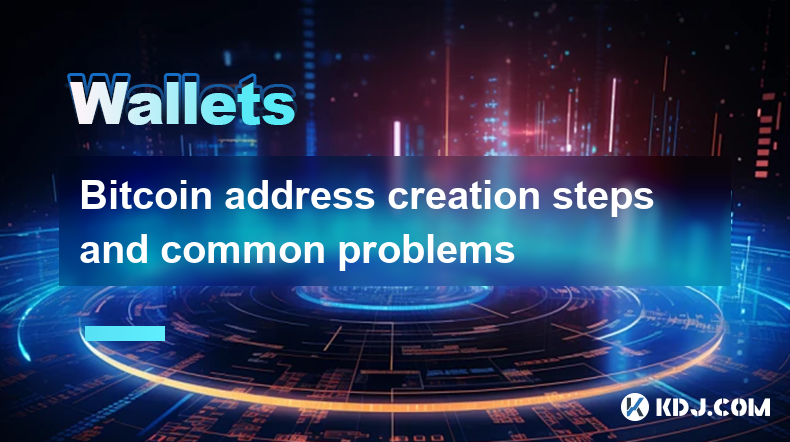
Bitcoin address creation steps and common problems
Mar 30,2025 at 06:07am
Understanding Bitcoin AddressesA Bitcoin address is a unique identifier, similar to a bank account number, used to receive Bitcoin. It's a string of alphanumeric characters generated from a public key, derived from your private key. Understanding the distinction between public and private keys is crucial for Bitcoin security. Your private key should be...
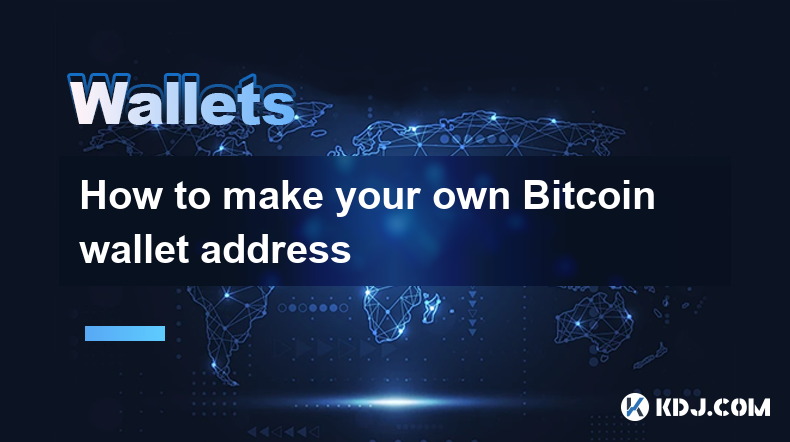
How to make your own Bitcoin wallet address
Mar 29,2025 at 08:42pm
Creating your own Bitcoin wallet address is crucial for securing and managing your Bitcoin holdings. It allows you to independently receive and send Bitcoin without relying on third-party services. This process involves understanding the different types of wallets and choosing the one that best suits your needs and technical expertise. Incorrectly gene...
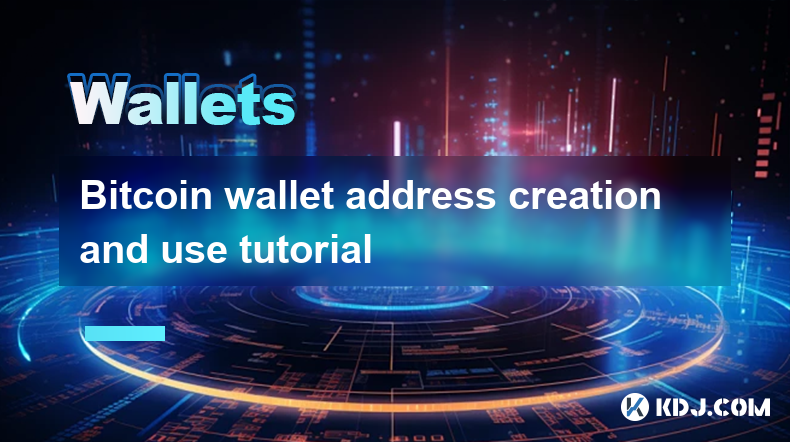
Bitcoin wallet address creation and use tutorial
Mar 29,2025 at 10:14pm
Understanding Bitcoin Wallet AddressesA Bitcoin wallet doesn't store Bitcoin in the way a traditional bank account does. Instead, it stores private keys, which are cryptographic secrets allowing you to access and spend your Bitcoin. Your Bitcoin address, on the other hand, is a public identifier, like an email address, that others can use to send you B...

Bitcoin address generation and secure storage guide
Mar 30,2025 at 08:07am
Understanding Bitcoin AddressesA Bitcoin address is essentially your public key, a string of alphanumeric characters used to receive Bitcoin. It's analogous to your bank account number. Unlike your private key, which is crucial for spending your Bitcoin, your address can be shared publicly without compromising your funds. Generating a new address is sim...
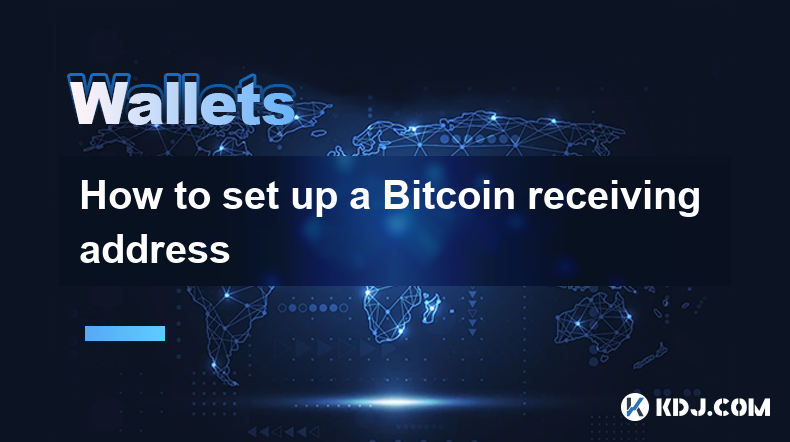
How to set up a Bitcoin receiving address
Mar 30,2025 at 06:14pm
Understanding Bitcoin Receiving AddressesA Bitcoin receiving address is essentially your unique identifier on the Bitcoin network. It's a string of alphanumeric characters that allows others to send Bitcoin to you. Think of it like your bank account number, but specifically for Bitcoin. You need a receiving address to receive Bitcoin. Crucially, you ca...

How to easily generate a Bitcoin payment address
Mar 29,2025 at 10:49am
Generating a Bitcoin payment address might seem daunting, but it's actually quite straightforward. This process is crucial for receiving Bitcoin, as each transaction requires a unique address. Understanding how this works is fundamental to using Bitcoin effectively. This guide will walk you through the simple steps, regardless of your technical experti...

Bitcoin address creation steps and common problems
Mar 30,2025 at 06:07am
Understanding Bitcoin AddressesA Bitcoin address is a unique identifier, similar to a bank account number, used to receive Bitcoin. It's a string of alphanumeric characters generated from a public key, derived from your private key. Understanding the distinction between public and private keys is crucial for Bitcoin security. Your private key should be...

How to make your own Bitcoin wallet address
Mar 29,2025 at 08:42pm
Creating your own Bitcoin wallet address is crucial for securing and managing your Bitcoin holdings. It allows you to independently receive and send Bitcoin without relying on third-party services. This process involves understanding the different types of wallets and choosing the one that best suits your needs and technical expertise. Incorrectly gene...

Bitcoin wallet address creation and use tutorial
Mar 29,2025 at 10:14pm
Understanding Bitcoin Wallet AddressesA Bitcoin wallet doesn't store Bitcoin in the way a traditional bank account does. Instead, it stores private keys, which are cryptographic secrets allowing you to access and spend your Bitcoin. Your Bitcoin address, on the other hand, is a public identifier, like an email address, that others can use to send you B...

Bitcoin address generation and secure storage guide
Mar 30,2025 at 08:07am
Understanding Bitcoin AddressesA Bitcoin address is essentially your public key, a string of alphanumeric characters used to receive Bitcoin. It's analogous to your bank account number. Unlike your private key, which is crucial for spending your Bitcoin, your address can be shared publicly without compromising your funds. Generating a new address is sim...

How to set up a Bitcoin receiving address
Mar 30,2025 at 06:14pm
Understanding Bitcoin Receiving AddressesA Bitcoin receiving address is essentially your unique identifier on the Bitcoin network. It's a string of alphanumeric characters that allows others to send Bitcoin to you. Think of it like your bank account number, but specifically for Bitcoin. You need a receiving address to receive Bitcoin. Crucially, you ca...
See all articles






















































































